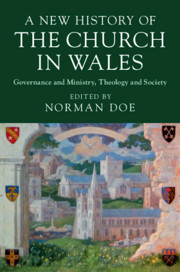Book contents
- Reviews
- A New History of the Church in Wales
- A New History of the Church in Wales
- Copyright page
- Contents
- Plates
- Contributors
- Foreword
- Editorial Preface
- Introduction
- Part I Historical Antecedents and Overview of the Century
- Part II Governance and Ministry
- Part III Doctrine, Liturgy, Rites and Other Faith Communities
- Part IV The Church and Society
- 13 Welsh Anglicans and Cultural Debate
- 14 The Church and Education
- 15 The Church and the Welsh Language
- 16 The Church, State and Society
- Part V Conclusions
- Bibliography
- Index
- Plate Section (PDF Only)
15 - The Church and the Welsh Language
from Part IV - The Church and Society
Published online by Cambridge University Press: 22 February 2020
- Reviews
- A New History of the Church in Wales
- A New History of the Church in Wales
- Copyright page
- Contents
- Plates
- Contributors
- Foreword
- Editorial Preface
- Introduction
- Part I Historical Antecedents and Overview of the Century
- Part II Governance and Ministry
- Part III Doctrine, Liturgy, Rites and Other Faith Communities
- Part IV The Church and Society
- 13 Welsh Anglicans and Cultural Debate
- 14 The Church and Education
- 15 The Church and the Welsh Language
- 16 The Church, State and Society
- Part V Conclusions
- Bibliography
- Index
- Plate Section (PDF Only)
Summary
This chapter explores the place of the Welsh language in the life of the Church in Wales. Prior to disestablishment, though the Bible and Prayer Book had been translated into Welsh in the sixteenth century, within the established Church of England there was a general contempt for the Welsh language and the church was alienated from Welsh speaking communities. In the years after 1920, the story of the language in the church may be best understood in its social and political contexts: there was no equality of status as between English and Welsh in the life of the church - English dominated. 1947-1967 witnessed both rejuvenation as well as scandal, paerticularly surrounding the election of Welsh-speaking bishops. Then followed years of turbulence, with political campaigns in secular society and politics for greater protection and promotion of the language. These impacted on the church. From the 1970s we see the translation into Welsh of such texts as the constitution and forms of service. The Welsh Language Act 1993, the devolution legislation of 1998, and native Welsh law resulting from it, has consolidated the principle of the equality of Welsh and English in the church. But the church still faces issues in implementing the values embodied in these political and legal changes in many aspects of its life and ministry.
- Type
- Chapter
- Information
- A New History of the Church in WalesGovernance and Ministry, Theology and Society, pp. 275 - 292Publisher: Cambridge University PressPrint publication year: 2020



